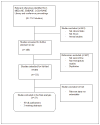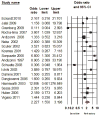A systematic analysis of efficacy of second-line chemotherapy in sensitive and refractory small-cell lung cancer
- PMID: 22722788
- PMCID: PMC3381878
- DOI: 10.1097/JTO.0b013e31824c7f4b
A systematic analysis of efficacy of second-line chemotherapy in sensitive and refractory small-cell lung cancer
Abstract
Introduction: Small-cell lung cancer (SCLC) patients unresponsive or relapsing within 90 days after frontline chemotherapy have poor prognosis and are treated with regimens different from the first-line regimen. Potential differences in the efficacy of second-line therapy for refractory and sensitive SCLC have not been well studied.
Methods: Studies that enrolled sensitive and refractory (relapse < 90 days or > 90 days) SCLC patients for second-line therapy were identified using electronic databases (MEDLINE, EMBASE, and Cochrane library), and meeting abstracts databases. A systematic analysis was conducted using Comprehensive Meta Analysis (version 2.2.048) software to calculate the odds ratio of response and 95% confidence interval. Median overall survival time for sensitive and resistant SCLC patients was compared by two-sided Student's t test. We tested for significant heterogeneity by Cochran's chi-square test and I-square index.
Results: Twenty-one studies published between 1984 and 2011 were eligible for this analysis with a total of 1692 patients enrolled; 912 with sensitive and 780 with refractory SCLC. The overall response rate was 17.9% with a higher response rate of 27.7% (range, 0%-77%) for sensitive SCLC versus 14.8% (range, 0%-70%) for refractory patients; p=0.0001. Pooled overall odds ratio of response was 2.235 (95% confidence interval: 1.518-3.291; p=0.001) favoring patients with sensitive disease. Median overall survival time was 6.7 months with a weighted survival of 7.7 and 5.4 months for sensitive and refractory SCLC, respectively (p = 0.0035).
Conclusions: Refractory SCLC patients derive modest clinical benefit from second-line chemotherapy. However, response and survival outcomes are superior with chemosensitive disease.
Figures







References
-
- Jemal A, Siegel R, Xu J, et al. Cancer statistics. CA Cancer J Clin. 2010;60:277–300. - PubMed
-
- Owonikoko TK, Ragin CC, Belani CP, et al. Lung cancer in elderly patients: an analysis of the surveillance, epidemiology, and end results database. J Clin Oncol. 2007;25:5570–7. - PubMed
-
- Owonikoko TK, Ramalingam S. Small cell lung cancer in elderly patients: a review. J Natl Compr Canc Netw. 2008;6:333–44. - PubMed
-
- Clark R, Ihde DC. Small-cell lung cancer: treatment progress and prospects. Oncology (Williston Park) 1998;12:647–58. discussion 661–3. - PubMed
Publication types
MeSH terms
Grants and funding
LinkOut - more resources
Full Text Sources
Other Literature Sources
Medical

